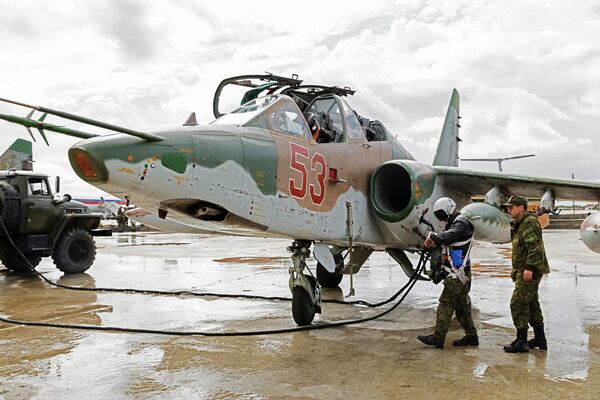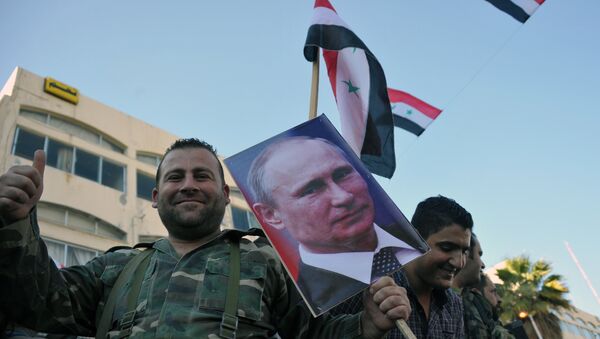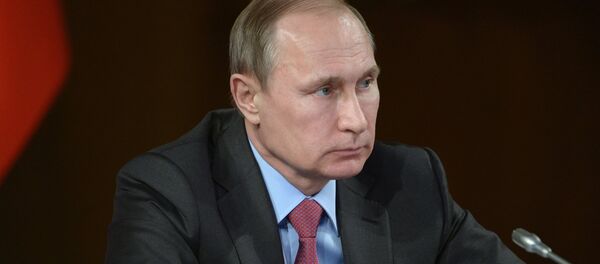The leitmotif of Russian President Putin's foreign policy is the demilitarization of the ongoing new Cold War in the Middle East and also in Ukraine, Stephen F. Cohen, professor emeritus of Russian studies at New York University and Princeton University, noted in his latest interview on The John Batchelor Show.
There is nothing surprising about Putin's decision to partially withdraw Russian military forces from Syria, Cohen stressed.
Those who closely watch the Kremlin's moves in the Middle East remember what Vladimir Putin said at the beginning of the Russo-Syrian joint campaign.
"When Putin went on television in October, in Russia, and announced that he has sent bombers and weaponry to Syria he said: 'I have two purposes — to bolster the president of Syria Assad's army, so that it can fight terrorists on the ground, because we, Russia, are not going to send combat soldiers. And secondly, once the Syrian army is stabilized, the political processes of compromise and negotiation can begin.' And he said: 'I think it will take three to five months.' Bingo, bingo, bingo. Mission accomplished," the American academic said referring to Moscow's latest achievements on the ground in Syria.
"Said and done" as an old Latin proverb states.
That is why the tone of media coverage in Europe has changed to a kind of admiration for Russia's efficiency and for the fact that Putin does what he says he is going to do, Cohen underscored, adding that Moscow has gained a great deal of credibility in the eyes of European policymakers.
Experts wonder why the Kremlin decided to pull out its military forces from Syria, at a time when Russia has gained great military advantages.
The crux of the matter is that Vladimir Putin fights to get negotiations, Professor Cohen highlighted.
Russia does not fight like the US: it does not fight to overwhelm unconditional surrender.

"Russia does not begin wars, it ends wars," Cohen remarked, citing an old saying.
The US party of war's demonization of Moscow and Vladimir Putin is completely divorced from reality. But what makes matters even worse, American hawks appear to believe their own false narrative more than what is really going on in Russia and the rest of the world.
"What Putin wants above all is a stable world, where the great powers cooperate on matters of security, while retaining all their diversity. That's Putin's image of the world. It's not aggression. This is complete misreading of Putin. That is why everybody is surprised, surprised, surprised," Cohen told John Batchelor.
Dr. Paul Craig Roberts, a prominent American economist, former Assistant Secretary of the Treasury for Economic Policy and author, echoes Cohen's stance in his recent Op-Ed for Sputnik.
The American media "are captives of their own propaganda," that is why Russia's latest political move in Syria has caught them by surprise, Dr. Roberts remarks.
Now, when Russia's military aims in Syria have been achieved, Vladimir Putin switches to diplomacy.
"Putin has… demonstrated that, unlike Washington, Russia is able to achieve decisive military results in a short time without Russian casualties and to withdraw without becoming a permanent occupying force. This very impressive performance is causing the world to rethink which country is really the superpower," the US expert underscores.
In his report regarding the Russian withdrawal from Syria, another reputable analyst, The Saker, writes that the Kremlin's decision fully complies with its initial objectives.
"The Russian intervention is a stunning success, that is indisputable," The Saker, the pseudonym for the US-based top level European military analyst, stresses.
"Vladimir Putin and the Russian military ought to be particularly praised for having set goals fully commensurate with their real capabilities… Today's [March 14] declaration shows that the Russians are also sticking to their initial exit strategy and are now confident enough to withdraw their forces. That is nothing short of superb (when is the last time the USA did that?)," the analyst underscores.




